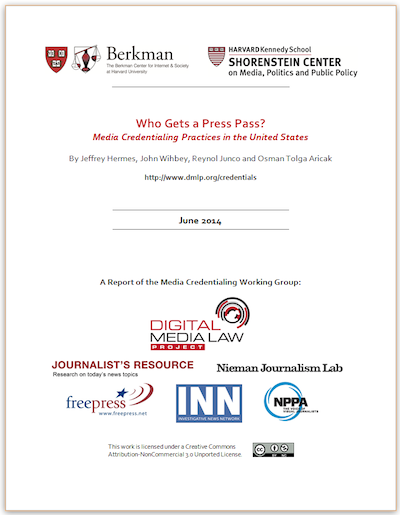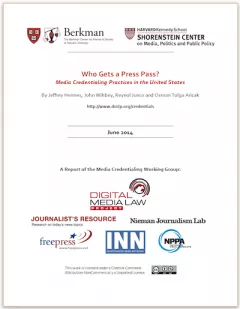New Report from the DMLP: Who Gets a Press Pass? Media Credentialing Practices in the United States
 The Digital Media Law Project at Harvard University’s Berkman Center for Internet & Society and the Journalist’s Resource project at Harvard’s Shorenstein Center on Media, Politics and Public Policy are pleased to release a new report: Who Gets a Press Pass? Media Credentialing Practices in the United States.
The Digital Media Law Project at Harvard University’s Berkman Center for Internet & Society and the Journalist’s Resource project at Harvard’s Shorenstein Center on Media, Politics and Public Policy are pleased to release a new report: Who Gets a Press Pass? Media Credentialing Practices in the United States.
Media credentials have long played a critical role in newsgathering in
the United States, allowing journalists to gain special access to places and events denied to the general public. There are, however, many
inconsistencies among regulatory standards for the issuance of
credentials, and many circumstances where the decision of whether and
how to issue credentials is left up to individual agencies with no
regulatory guidance at all. Moreover, upheaval in the journalism
industry has introduced new actors in the journalism ecosystem,
complicating decisions by government agencies and private gatekeepers
about who should be entitled to special access.
Who Gets a Press Pass? presents a first-of-its-kind analysis of
this complex environment, exploring media credentialing practices in the United States through a nationwide survey of more than 1,300
newsgatherers.
"Media credentials represent one of the most important interactions
between journalists and those who control access to events and
information," said Jeff Hermes, director of the Digital Media Law
Project and an author of the report. "This study finds common threads
that run through decisions by various types of organizations, as a
starting point to make sense out of the vast array of credentialing
practices in the United States."
Survey respondents included a wide range of journalists across the
country, from employed journalists at long-standing media organizations
to independent bloggers and activists fulfilling the information needs
of their communities.
“The findings here speak to the vital issue of ensuring that journalists of all kinds can bear witness to important events in our society,” said Shorenstein Center Director Alex S. Jones. “The ability of the press to operate freely, robustly and without interference is essential to an
informed public. We must be vigilant in making sure that all
organizations issuing press credentials exert the maximum effort to
accommodate media members and enable the free flow of information.”
The survey asked about respondents’ experiences in seeking press
credentials from federal, state, local, and private organizations from
2008 through 2013, revealing the following nationwide trends:
- One out of every five journalists surveyed who applied for a credential was denied at least once by a credentialing organization in the past five years.
- Although there may be reasonable grounds for denial in some cases, the data suggest systemic issues at many levels.
- Freelancers are more than twice as likely as employed journalists to be denied a credential at least once.
- Those identifying themselves as photographers are almost twice as likely as others to be denied a credential at least once.
- Those identifying themselves as activists are more than twice as likely as others to be denied a credential at least once.
Who Gets a Press Pass? is a report of the Media Credentialing
Working Group, a collaboration of six non-profit organizations with a
common interest in the ability of journalists and photographers to
inform the public about important events: the Digital Media Law Project, Journalist’s Resource, the National Press Photographers Association,
Free Press, the Investigative News Network, and the Nieman Journalism
Lab. It is the hope of the Working Group that this study will help
newsgatherers to identify particular tensions in media credentialing
practices and to work with credentialing agencies to resolve these
tensions.
The report is available through the Digital Media Law Project’s website at http://www.dmlp.org/credentials.
CONTACT:
Jeffrey Hermes, Esq.
Director, Digital Media Law Project @ Harvard University’s Berkman Center for Internet & Society
E-mail: [email protected]
Tel: (617) 495-7547
John Wihbey
Managing editor, Journalist’s Resource
Shorenstein Center on Media, Politics and Public Policy
Harvard Kennedy School
Email: [email protected]
Tel: (617) 496-9068
